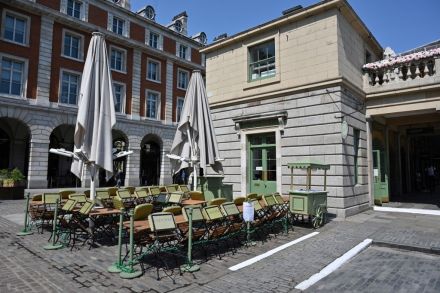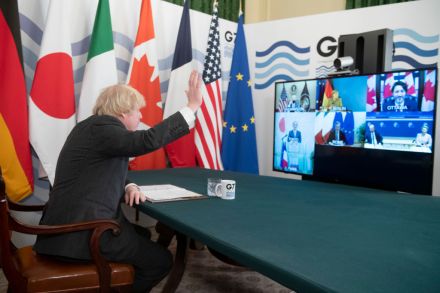The lockdown roadmap explained
12 min listen
Boris Johnson has finally set out his roadmap for easing lockdown. On the episode, Katy Balls talks to Isabel Hardman and James Forsyth about what to expect over the next few months.

Read about the latest UK political news, views and analysis.
12 min listen
Boris Johnson has finally set out his roadmap for easing lockdown. On the episode, Katy Balls talks to Isabel Hardman and James Forsyth about what to expect over the next few months.

As the Prime Minister announced the details of his government’s ‘roadmap’ out of lockdown in the Commons on Monday, no doubt some will have been cheering on the announcements, which will allow them to keep their pre-planned parties or holidays scheduled in their diaries. But the timeline has painted a grim picture for business in the months to come. According to the timetable, we are nearly two months away from outdoor dining being made legal again, and three months away from a return to indoor dining. While non-essential retail and personal care premises (including hair and nail salons) are billed to open on 12 April, social distancing measures look set to

After Boris Johnson’s Commons speech today outlining the government’s roadmap out of lockdown, he was met with a fiery response from his predecessor as Prime Minister, Theresa May. On behalf of her constituents in Maidenhead, the former PM laid into the government’s plans for the aviation sector, pointing out that simply publishing a review of international travel in April would not give passengers and the sector enough time to plan for the summer. A fair question, of course. But why did the former PM decide to focus on aviation in particular? One reason, May explained in the Commons, is that she was concerned about the economic hit to her constituency, which is close

Several of Tony Blair’s ideas have found their way into the government’s Covid policy, most notably the policy of prioritising first doses. The end of Boris Johnson’s statement today owed a lot to Blair. Johnson cast himself as charting a middle course between those who think the government’s plan is too ambitious and those who want restrictions eased faster. It was classic Blairite triangulation. The road map is an interesting document. It is initially cautious and the decision to put five weeks between easing measures means that we won’t be able to sit inside a pub until 17 May, a long way from the idea that things would be heading

Boris Johnson’s roadmap for emerging from the pandemic shows us quite how bad his sense of direction has been at times over the past few months. The Prime Minister and his colleagues in government have repeatedly insisted that they won’t be introducing vaccine passports — but today’s document confirms that ministers are in fact establishing a programme of work on ‘Covid status certification’, which is a rose by another name. Johnson has also had to deal with a conflict between his advisers (and within his own mind) over whether or not it is — as he has repeatedly suggested — possible to vaccinate one’s way out of this lockdown. Either


Boris Johnson today set out Britain’s route out of lockdown as the vaccination programme continues. Below is the full text of the government’s roadmap.

The vaccine news today is good, and better than would have been expected even a month ago. The Public Health Scotland data indicating that four weeks after the first dose of the Oxford / AstraZeneca vaccine there is a 94 per cent reduction in the risk of hospitalisation is phenomenal (the figure for Pfizer/BioNTech is 85 per cent). It suggests that the vaccines should deliver on the ‘protect the NHS’ part of the government’s strategy. This will lead to more Tory pressure on Boris Johnson for a faster easing of lockdown. The argument will go that given the data is better than expected, the pace of lockdown easing should be sped

15 min listen
Yet more personnel changes have happened in Downing Street, with Oliver Lewis the latest to depart. The weekend papers were full of briefings that Carrie Symonds is the reason for the latest strife. Cindy Yu talks to Katy Balls and Fraser Nelson about how much truth there is in that.

The government’s decision to set up a new research funding agency, to be known as the Advanced Research and Invention Agency (ARIA), marks an important break in UK science and innovation policy – potentially more important than any recent government initiative in this field. The aim, as the Business Secretary Kwasi Kwarteng explained last week, is to fund high-risk, high-reward research, ‘supporting ground-breaking discoveries that could transform people’s lives for the better.’ As part of this mission, the chief executive of ARIA will be free to choose which areas to research and which projects to fund without direction from ministers. It is this independence from political and bureaucratic control which

Boris Johnson’s political recovery in the last couple of months has been nothing short of remarkable. Not that he was ever down and out, of course, but having got a Brexit deal that both Farage and Starmer backed, followed by the success of the vaccine rollout, the Prime Minister once again looks unassailable. As for the Labour leader, things look much less rosy. But what hasn’t been said in the criticism of Starmer is that what has mostly caused the leader of the opposition’s dip is not his own incompetence but the Prime Minister’s recent good form. This has made me realise something about Boris: he bears a lot of comparison with one former prime

The Scottish Tories don’t mean to be the way they are. Sometimes they just can’t help it. They are being that way again over plans to let some prisoners vote in the forthcoming Scottish parliament elections. I am not convinced those elections should be going ahead at all in the middle of a pandemic but, if they are to, there are good reasons for prisoners to be enfranchised. The Tories intend to force a vote at Holyrood on Wednesday against allowing those serving custodial sentences of less than 12 months to participate in the May 6 election. MSPs voted last February to extend the franchise in order to comply with

Despite it being highly unfashionable to change your opinion, my lockdown stance has shown agility. For most of last year I was a ‘lockdown sceptic’. Not quite retweeting Piers Corbyn’s views on 5G, but equally not thrilled about spending every morning doing star jumps with Joe Wicks. I suspected lockdowns may ruin our children’s future forever, but was keen to not to be called a granny murderer. However, there was something about the words ‘deadly new strain’ which had an effect on me. Say what you want about epidemiologists, they know how to scare people. So I settled into being what I’d call a Covid ‘Centrist Dad’. Lockdown wise, I
When Boris Johnson stands at the despatch box on Monday afternoon to unveil his roadmap for ending the lockdown, those hoping for a big bang moment in ending restrictions will be left disappointed. Instead, the Prime Minister will announce a very gradual easing of the lockdown stretching to the summer – with Johnson reserving the right to make it even slower should the data go the wrong way. Having been stung by previous promises to avoid further lockdowns, the roadmap will be more cautious than members of the Conservative party’s Covid Recovery Group would like. The plan is to be signed off by ministers ahead of Johnson announcing it in the Chamber and addressing the nation on Monday evening.

The national vaccine rollout is continuing unabated, with over 17 million adults now having received a first dose. The government has even brought forward its target date for all adults to be offered a jab from September to the end of July. Hancock said that, although it was still early days, the success of the rollout did seem to be having a visible effect on the rate of re-infection: MH: We have seen early data [showing] that there’s a reduction in transmission from those who get the jab… There are signs that the numbers in hospital are falling much more sharply than they were in the first wave. There’s further


Two regular faces have been rather absent from Sky News of late: morning anchor Kay Burley and political editor Beth Rigby. The pair were taken off air – Burley for six months and Rigby for three – after they were accused of breaching social distancing rules at Burley’s birthday bash. So, Mr S was intrigued by Matt Hancock’s appearance this morning on Ridge on Sunday. When Sophy Ridge put to the Health Secretary that many people were confused as to why all adults would receive the jab by the end of the July but they couldn’t book a holiday, Hancock replied: ‘Well I know that everyone at Sky News is keen

Naming a child turns out to be one of the hardest things you can do. The secret to nailing it is to avoid choosing something outlandish or freakish at one extreme – but then sidestep the trap of settling on something profoundly mundane at the other. Unless you are a rock star or a tech billionaire, for instance, it best to avoid the following: Tree-stump, Treble Clef, or a non-verbal sign that was formerly adopted by the artist Prince when he was still a going concern – these are not the imprimatur available to the majority of us who have to occupy terra firma. And yet… and yet, you don’t

The right is usually much better than the left at harnessing the awesome power of the folk memories that surround Britain’s heroic second world war struggle. The idea of British exceptionalism at its most evocative moment between 1939 and 1945 was crucial to Brexit and crucial to securing popular backing for the Falklands War a generation earlier too. So for Keir Starmer to base his economic pitch for power not on modern monetary theory or any other piece of leftish guru-jargon, but instead on drawing parallels with the reforming post-war Labour administration of Clement Attlee is smart politics. The Attlee government has a powerful mythology of its own that adds
13 min listen
While coronavirus has dominated the last year in politics, domestic issues are creeping back onto the agenda. Near the top of the list is reaching Net Zero by 2050 – not least because climate-conscious Joe Biden is now in the White House. Can Britain hit its target? Katy Balls speaks to James Forsyth and Sam Lowe, senior research fellow at the Centre for European Reform.


22 min listen
On this episode, Cindy Yu begins by explaining why China and Russia are ahead in the great game of vaccine diplomacy. (00:45) Fraser Nelson is next, and he tells us why The Spectator went to court. (10:35) Josiah Gogarty finishes the podcast, asking how middle-class your dad is. (16:35)

The High Court has said the government acted unlawfully. It is important that is understood, because ‘unlawful’ is a word that can easily mislead. Above all, no one should accidentally think the Court has said that any of the PPE contracts are unlawful. They are not. What the Court has said is that because, on average, the contracts were published on a website after 47 days, the Department of Health and Social Care was unlawful because it promises to publish within 30 days. The government promised 30 days and 47 days is more than 30: that is unlawful. PPE was needed because of the pandemic and, due to the global